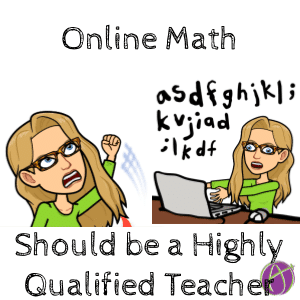Why we need qualified math teachers in closing math achievement gaps
Wiki Article
All Regarding Professional Mathematics Teachers: Their Role in Fostering Pupil Growth and Achievement in Math Education And Learning
Qualified mathematics instructors are crucial fit pupils' understanding and recognition of maths. Their deep expertise and effective teaching techniques can considerably affect pupil results. These instructors not only present mathematical abilities but also cultivate an inclusive setting that meets varied learning requirements. As they adopt innovative approaches, the inquiry emerges: how do these strategies particularly enhance student interaction and achievement in mathematics?The Importance of Certified Mathematics Teachers in Education And Learning
Lots of elements add to trainee success in mathematics, the existence of qualified mathematics instructors stands out as an important aspect in fostering efficient learning environments. Research continually shows that trainees educated by instructors with solid mathematical backgrounds tend to show higher levels of understanding and achievement. Qualified mathematics instructors not only have a deep understanding of mathematical principles however likewise the instructional skills needed to convey complicated ideas in available methods. They can determine trainees' individual needs and adapt their mentor strategies as necessary, advertising inclusivity and involvement. In addition, their knowledge allows them to produce a favorable classroom environment that motivates risk-taking and strength in analytical. This supportive setting promotes a development mindset among pupils, enhancing their self-confidence and inspiration in mathematics. In general, qualified mathematics instructors play a crucial duty in shaping trainees' attitudes toward mathematics, inevitably affecting their scholastic trajectories and future opportunities.Trick High Qualities of Reliable Mathematics Educators
Effective mathematics educators possess several vital qualities that improve their teaching effectiveness. These consist of deep subject understanding, strong communication abilities, and adaptive training techniques that satisfy varied knowing requirements. Recognizing and cultivating these characteristics can significantly affect student understanding and engagement in mathematics.Deep Subject Understanding
While a solid instructional strategy is vital, deep subject understanding remains a keystone of effective mathematics educators. Such knowledge allows teachers to understand mathematical ideas thoroughly and to expect student misconceptions. Educators with a strong understanding of math not just deliver content with self-confidence but additionally attach various subjects, promoting a richer learning atmosphere. They are furnished to use diverse mentor approaches that satisfy different discovering styles, making intricate ideas extra accessible. Additionally, deep subject expertise empowers instructors to participate in purposeful discussions with pupils, urging critical reasoning and analytical skills. Eventually, the depth of understanding that mathematics teachers possess greatly affects pupils' scholastic growth and achievement in mathematics, laying a strong foundation for future knowing.
Strong Communication Abilities
Deep subject understanding alone wants for cultivating an efficient knowing atmosphere in maths; solid interaction abilities are similarly essential for reliable mathematics teachers. These skills make it possible for educators to convey intricate concepts in available means, guaranteeing that students grasp fundamental ideas. Reliable interaction entails not only clearness yet also the capacity to proactively listen, urging pupil involvement and attending to mistaken beliefs. By promoting an open dialogue, teachers develop a helpful class ambience where pupils really feel comfortable asking concerns and sharing their thoughts. Additionally, strong communicators can adapt their language and explanations to match varied discovering designs, enhancing trainee interaction and understanding. Ultimately, reliable interaction bridges the gap in between a teacher's knowledge and a trainee's understanding, substantially affecting academic accomplishment in mathematics.Flexible Teaching Strategies
A variety of adaptive mentor approaches are crucial for efficient mathematics educators intending to satisfy the varied needs of their students. These approaches allow instructors to customize their guideline based on individual discovering capabilities, rate of interests, and styles. qualified math teachers. Methods such as differentiated instruction, where teachers modify process, product, or material, help address varying effectiveness degrees. Furthermore, incorporating technology and interactive devices can boost involvement and promote customized understanding experiences. Developmental analyses enable teachers to check development and change teaching methods as necessary. Collective group job promotes peer knowing, fostering a helpful setting. By employing these flexible methods, math instructors can create inclusive class that urge all pupils to thrive and achieve their academic goals, ultimately cultivating a love for mathematicsInnovative Training Approaches Used by Math Educators
As instructors look for to involve students better, innovative training methods have actually arised as a prime focus in mathematics classrooms. These methods aim to improve understanding and retention of mathematical principles. One noticeable method is the usage of innovation, such as interactive software program and online simulations, which allows trainees to visualize complex troubles and get immediate feedback.Additionally, project-based discovering motivates collaboration and real-world application of math concepts, fostering important believing skills. Gamification, where math ideas are integrated right into game-like settings, has actually likewise obtained appeal, making discovering more pleasurable and encouraging for students.Moreover, set apart direction tailors lessons to suit varying skill degrees, ensuring that all pupils can advance at their very own speed. By using these cutting-edge approaches, mathematics teachers develop vibrant knowing experiences, eventually advertising greater student growth and success in mathematics.Creating Inclusive Discovering Settings
Producing inclusive discovering atmospheres in maths education and learning entails applying varied knowing techniques and fostering collective group activities. These techniques deal with the diverse demands of pupils, making sure that everybody has the possibility to be successful and involve. By focusing on inclusivity, mathematics teachers can cultivate a class environment that supports all students.Diverse Discovering Strategies
While lots of educators endeavor to promote comprehensive knowing settings, implementing diverse learning techniques is crucial for efficiently getting to all trainees. These strategies encompass a series of mentor techniques customized to suit differing learning histories, styles, and capabilities. For instance, including visual help, manipulatives, and innovation can involve students that may have problem with standard instruction. Furthermore, distinguished direction allows educators to change assessments and jobs, guaranteeing that every student can access the curriculum at their very own level. Culturally receptive pedagogy additionally plays a significant function in recognizing and valuing the varied experiences of trainees, consequently improving their link to the material. By making use of these diverse knowing techniques, qualified math educators can develop a helpful atmosphere where all students are equipped to succeed in mathematics.Collaborative Group Activities

The Influence of Qualified Mathematics Educators on Student Success
The presence of qualified math instructors considerably affects trainee achievement, as efficient direction can link voids in understanding and cultivate a positive discovering atmosphere. Research suggests that pupils educated by seasoned teachers demonstrate higher degrees of effectiveness in mathematical concepts compared to their peers. Qualified math educators have a deep understanding of mathematical web content, allowing them to present product in diverse manner ins which cater to various learning styles. This adaptability not only improves understanding but likewise improves student self-confidence in their abilities.Moreover, certified instructors typically employ developmental evaluations to keep an eye on pupil development, permitting timely treatments when necessary. Their ability to create engaging lessons motivates trainee participation and promotes a development attitude. Therefore, the effect of qualified mathematics teachers prolongs beyond mere academic efficiency; it cultivates a sense of interest and durability in pupils, ultimately leading to boosted end results in mathematics and a more powerful structure for future discovering.Strategies for Involving Students in Mathematics
Engaging trainees in mathematics calls for a complex technique that includes diverse techniques to catch their interest and improve understanding. One reliable method is using real-world applications, allowing students to see the significance of mathematical concepts in day-to-day life. Including technology, such as interactive software application and online resources, can likewise cultivate involvement by providing dynamic discovering experiences.Group work motivates partnership, enabling students to gain from each other and establish problem-solving skills in a helpful atmosphere. Additionally, integrating games and hands-on tasks can make discovering more delightful and accessible.Differentiated guideline deals with numerous learning designs, making sure that all trainees can connect with the product. Finally, offering timely comments assists trainees identify their progression and locations for renovation, fostering a growth mindset. By using these strategies, instructors can create an appealing mathematics class that promotes pupil growth and accomplishment.The Role of Expert Growth in Enhancing Math Teaching Skills
While lots of instructors recognize the importance of reliable teaching methods, expert growth plays an important role in improving mathematics teaching abilities (qualified math teachers). Continuous training possibilities allow educators to remain current with pedagogical advancements, mathematical content, and technical devices. Workshops and workshops provide discussion forums for instructors to collaborate, share ideal techniques, and discuss obstacles they encounter in the classroom.Furthermore, professional advancement promotes a click here for info growth state of mind amongst teachers, urging them to reflect on their techniques and adapt their strategies based upon trainee requirements. This recurring knowing procedure not just boosts teachers' mathematical understanding but additionally equips them with innovative training methods that can cause boosted pupil involvement and achievement.Ultimately, a structured professional advancement program can significantly impact the high quality of mathematics education, ensuring that teachers are well-prepared to motivate and lead their trainees toward success in mathsFrequently Asked Questions
What Certifications Are Required to Become a Mathematics Educator?
To become a mathematics teacher, people commonly require a bachelor's degree in mathematics or education, mentor qualification, and a strong understanding of mathematical principles. Added certifications may include specialized training in rearing and class administration skills.
Just How Do Math Educators Assess Student Development in the Class?
Mathematics teachers assess pupil progression through various methods, consisting of tests, quizzes, and projects (qualified math teachers). They also utilize observational evaluations and trainee participation to determine understanding, adjusting direction based on private and group performance to boost discovering outcomesWhat Challenges Do Mathematics Educators Typically Face?
Mathematics educators generally deal with difficulties such as varying student ability degrees, limited resources, curriculum constraints, and the requirement to involve pupils efficiently. In addition, they often encounter stress to improve standardized test scores and manage class habits.Just How Can Parents Support Their Child's Mathematics Education and learning?
Moms and dads can support their child's mathematics education by giving a conducive learning atmosphere, engaging in math-related activities, urging a positive perspective in the direction of challenges, and keeping open interaction with teachers to monitor look at this website development and address worries.What Resources Are Readily Available for Math Educators to Enhance Their Abilities?
Various sources are available for mathematics educators, consisting of online programs, specialist advancement workshops, peer cooperation teams, instructional websites, and mentor journals. These devices improve training techniques, grow subject knowledge, and inevitably improve pupil knowing outcomes in mathematics. Qualified math educators are important in forming pupils' understanding and recognition of mathematics. Many variables add to student success in maths, the existence of certified math instructors stands out as an essential element in fostering reliable discovering atmospheres. Furthermore, certified mathematics teachers help with these communications by purposefully organizing students, making certain that each group includes a mix of ability levels and histories. The existence of qualified math educators significantly influences student achievement, as effective instruction can bridge spaces in understanding and foster a positive discovering setting. Mathematics instructors frequently encounter challenges such as differing student ability levels, limited sources, curriculum restrictions, and the need to engage trainees effectively.Report this wiki page